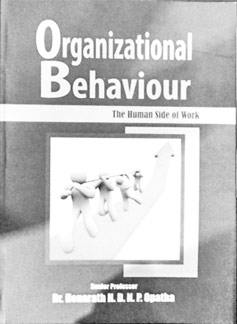|
Book REVIEW
More than just a text book
Reviewed by Dr Alan Robertson
Management education has been offered in Sri Lanka for more than 50
years, in the process becoming a very popular option for those seeking
university and professional qualifications at all levels. Much of the
theoretical underpinning for management is centred on the study of
organisational behaviour, which focuses on the human aspects of
organisations, with the result that this is an essential component of
any management course.
 Sri
Lankan educators and students have, until now, been dependent upon
textbooks related to organisational behaviour written by overseas
academics. These texts are valuable resources in their own right in that
they present the very diverse range of theories and practices, which
make up the complex web of individual and group behaviour and
interaction within organisations and draw extensively upon case studies,
examples and vignettes. However, almost exclusively, they are based upon
a world far removed from Sri Lanka and therefore often difficult to
relate to the experience of its students, practitioners and educators. Sri
Lankan educators and students have, until now, been dependent upon
textbooks related to organisational behaviour written by overseas
academics. These texts are valuable resources in their own right in that
they present the very diverse range of theories and practices, which
make up the complex web of individual and group behaviour and
interaction within organisations and draw extensively upon case studies,
examples and vignettes. However, almost exclusively, they are based upon
a world far removed from Sri Lanka and therefore often difficult to
relate to the experience of its students, practitioners and educators.
While one might ponder as to why this situation has continued for so
long, the good news is that finally Sri Lanka has its own organisational
behaviour textbook, authored by Senior Professor Dr. Henarath H. D. N.
P. Opatha of the Department of Human Resource Management, Faculty of
Management Studies and Commerce, University of Sri Jayewardenepura.
Professor Opatha is well recognised and highly regarded as a teacher,
researcher and author and has the distinguished achievement of being the
first Senior Professor in his Faculty at the University of Sri
Jayewardenepura.
And the good news gets better when one opens the pages of the text,
appropriately titled 'Organisational Behaviour: The Human Side of Work'.
Not only does Professor Opatha present very clearly the manifold facets
of what characterises human behaviour in the workplace, he also
illustrates them with well-crafted case studies, stories and examples.
which are both insightful and thought- provoking, breathing life into
theory and thereby enhancing its relevance and understanding. It's not
just a textbook. In many ways it is a compendium of the intricacies of
dealing with people in the workplace.
The organisation of the chapters allows the reader to commence the
learning journey with the understanding of what characterises us as
individuals and how this impacts on the very significant work-related
attributes of attitude, perception and motivation. Drawing from this
foundation, Professor Opatha explores the impact of these individual
characteristics upon critical organisational issues: communication,
conflict, negotiation and leadership.
Individuals, now more than ever, are encouraged to operate as part of
work groups and teams. Group dynamics is therefore examined in detail as
it is an integral component of behavior within an organisation in both
its formal and informal manifestations.
Finally, the author moves to the broad organisational level and in
successive chapters relates the impact of organisational behaviour to
internal power and politics, structure, culture and change.
Each chapter contains review questions and activities, which teachers
will find of great value. I personally see the case studies as an
excellent teaching tool. They are interesting and, in fact, I spent
enjoyable hours reading them. Most importantly, however, is their direct
relevance to the Sri Lankan context and therefore of significant
potential value in implementing the learning and understanding of
organisational behaviour throughout the country.
Professor Opatha is to be congratulated on his initiative and
endeavor in authoring this much needed publication which, as with his
earlier books on human resource management and personal development,
will be a valued addition to management education in Sri Lanka for many
years to come. His achievement is, in my opinion, even more merit-worthy
in that he is the sole author, whereas most other texts on
organisational behaviour are, because of the broad scope of this area of
study, produced by multiple contributors.
(Dr Alan Robertson, Dean of Studies, Nawaloka
College of Higher Studies, Colombo 03, Sri Lanka) |

